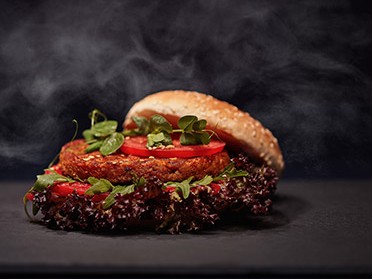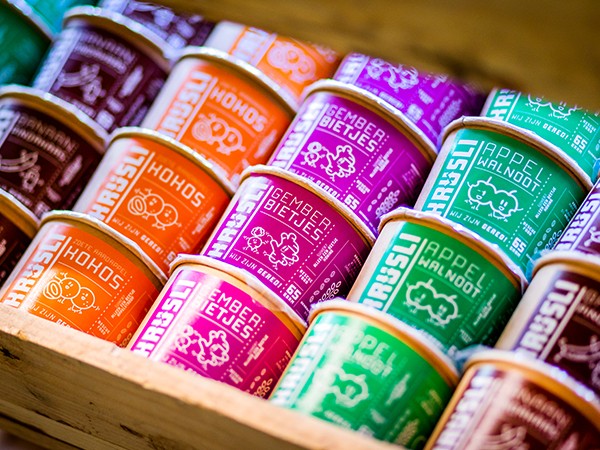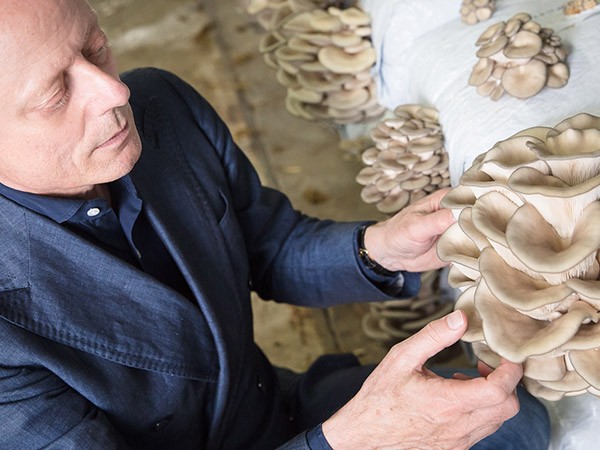
Burgers of tomato surpluses, bitterbals of circularly grown oyster mushrooms and muesli of saved peanuts. These and other sustainable products, coming from start-ups, were on the shelves of Lidl last summer. A next step in the sustainable policy of the discounter.
‘It is in our DNA’, says Erik van den Hoogen, senior procurement manager of Lidl Netherlands, about sustainable choices made by the company. The retailer is thus at the cradle of the development of the MSC quality mark, Lidl has the Netherlands’ most sustainable distribution centre and since 2012, ten branches are provided with solar panels each year. Van den Hoogen adds: ‘As a discounter we are also opposed to waste. The Future Goods theme week last summer was a next step in which we implemented this principle in our assortment as well’.
A year before that, in the summer of 2018, Lidl appealed to start-ups to pitch the food of the future. Over 200 parties responded, after which two selection rounds were held. In total, twelve producers were selected who were given shelf space for a week from 27 June 2019 onward, in all of Lidl’s 426 branches. Besides sustainability, taste sensation, degree of innovation and health were important criteria on which the selection was based. It was also considered if producers could handle the required volumes, how products were packaged and if the international IFC certificate (safety and quality) had been obtained. The definitive selection varied from socks of bio cotton and recycled old fishing nets (Star Sock) to vegan ice cream (Giugi Gelato) and edible insects (Little Hero).
The theme week was set up in cooperation with StartLife, an organisation associated with the WUR that helps agri start-ups develop themselves into leading companies. Lidl and StartLife have coached the selected suppliers during the preliminary trajectory. No unnecessary luxury, Van den Hoogen thinks. ‘For it is quite a difference if you have to produce a hundred or a few thousand items.’ Heidi Alemans of KRUSLI can affirm this. ‘The upscaling proved to be a huge challenge. We were not ready until three-quarters of an hour before the delivery was picked up’, she recounts. Her company produces crunchy mueslis from food that would otherwise go to animal food, disappear into the fermenter or is thrown away. Alemans: ‘We are real food rescuers. For instance, from brewers grain, broken or to small nuts and peanut butter that remains when the recipe changes, we make healthy breakfast products’. Convincing suppliers often requires a lot of persuasiveness, she declares: ‘Manufacturers initially deny that they have waste flows. But often we can convince them of the win-win situation. After all, we pay for the raw materials and the extra work they have – for instance, they have to develop additional barcodes and specifications. And they have a good story for the outside world. A supplier of vegetable crisps formulated it thus: ‘There are 99 reasons for not doing it, and only one good one to do it. That is what we believe in’.

Coaching during the preparation of the Future Goods week consisted of a number of workshops. In workshops in the main office for food safety and marketing were treated in detail. A visit to the distribution centre was also in the planning. ‘Very informative’, Doreen Westphal of Farmer & Foodie remembers. ‘Recipe development, marketing and sales we do ourselves; production, packaging and distribution are mostly outsources. For this week, that was very desirable, for we had to provide the volume that is usually produced for one year. Still, it was also very useful for us to see how a distribution of Lidl functions. For instance, we learned there how important it is that the products and pallets are labelled well, what should be on the packing slips and that boxes must not be closed with tape as this is inconvenient for shops.’
The products Farmer & Foodie are sometimes created through speed dates between farmers with waste flows and creative persons in the food branch. At Lidl, the producer had a tomato carrot burger on the shelves, the product of a collaboration with tomato growers and a carrot farmer from Flevoland. Westphal explains: ‘When the sun shines strongly on the greenhouses, growth goes faster and surpluses are created quickly. These are made into pulp, which we partly add value to by making them into burgers. The carrots we use have been rejected for sale because there are spots on them. We cut those away, after which the carrots are fit to be processed in the burgers’.

GRO, the producer of oyster mushroom bitterbals and croquettes, also uses a residual product. Founder Jan Willem Bosman Jansen: ‘We purchase coffee grounds from caterers, educational institutes, banks and ministries. We mix this with straw on which we grow oyster mushrooms. That is the basis of our products. We are now making the hybrid blended burger, vegetarian oyster mushroom burger, ragout buns and oven snacks’. There is an extraordinary story to tell about the company’s origins: ‘Ten years ago my wife and I ran a children’s home in Zimbabwe. There, the children learned to grow oyster mushrooms together with the local mushroom grower, on the waste flows of a nearby coffee plantation. The mushrooms were a welcome and wholesome variation on their limited diet of corn porridge. I took that idea back to the Netherlands with me. Here, the circularly grown oyster mushrooms and the products we make with them, are a good way to have people eat less meat. This way, we reduce the impact on the planet in two ways: fewer animal proteins and reducing the dump’. Given the strong professionalisation of GRO in recent years, the support in the field of marketing and logistics for the Future Goods Week was less relevant. However, Bosman Jansen is very positive about the coaching: ‘It was arranged perfectly’.
According to Bosman Jansen, the sale of oven bitterbals and croquettes also went successfully: ‘We have supplied 10,000 units per product, which have all been sold to my knowledge’. Erik van den Hoogen of Lidl confirms that the oyster mushrooms snacks sold very well during the theme week. ‘Just like the tomato carrot burgers and the vegan ice cream. And let’s not forget the insects. That was really a catcher for many journalists.’ Although an extensive evaluation still has to take place, Van den Hoogen is satisfied about how the week went: ‘The other products sold well too. Moreover, there was much positive attention for the theme week, both in the media and among consumers on our social media channels. It is good to notice that our customers like to be surprised!’.
Zzinga: sustainable and low-alcoholic drink, a new variant on honey wine that supports the protection of bees
Gigi Gelato: 100% vegan ice cream made of fruit and vegetables
KRUSLI: muesli made of waste flow food
Seamore: wraps made of seaweed
Little Hero: products of edible insects
Farmer&Foodie: carrot and tomato burgers of rescued vegetables
Bijt: grow kit for growing organic sproutings at home
Arenshof: potato bread from Limburg
Gro: bitterbals and croquettes of circularly grown oyster mushrooms
Food2smile: sugar-free snacks and sweets
Banabar: organic fruit and nut bar based on dried banana
Star Sock: socks of bio cotton and recycled old fishing nets
Source: © Vakblad Voedingsindustrie 2019